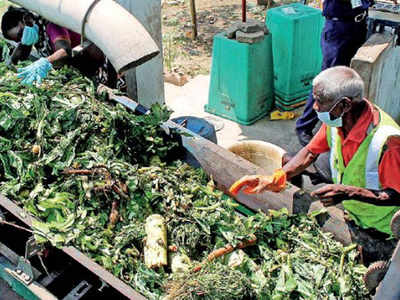The Hindu 16.04.2013
440-KW biogas plant using solid wastes to come up in Thanjavur

Administrative sanction given to the Rs. 90 lakh-project.
The State government has allotted Rs. 90 lakh for
putting up a bio-gas plant for producing 440 KW power using solid wastes
generated by the Thanjavur municipality.
Welcoming
the move, people of Thanjavur said that it would achieve two objectives.
It would help solve the power problem and second would help solid waste
management.
Thanjavur municipality generates 110 tonnes of solid waste a day, which is dumped at the compost yard at Srinivasapuram.
Market, hotel, kitchen, and animal waste could be used for preparing bio-gas and generate electricity.
After
administrative sanction was given for the project, tenders would be
called in and implemented, official sources at the municipality said.
N.
Ramachandran, president of Clean Thanjavur Movement and Vice Chancellor
of Periyar Maniammai University, welcomed the move of the government.
However, he said that segregation of wastes into bio-degradable and
awareness among people for collection and segregation of wastes alone
could make the programme a success.
As part of Clean
Thanjavur Movement, training had been given in solid waste management to
students, teachers, people, industrialists, hoteliers, and hospital
owners. Models for collection and segregation had been established in
the town.
“When the municipality puts up a bio-gas
plant, it can be made into a model plant and shown to students and
people to create awareness,” Mr. Ramachandran said.
PMU
had become a model for generating electricity from wastes. “We produce
60 KW of power from our bio-Methanation plant put up on our campus and
use for power requirement in our hostels,” Prof. Ramachandran said.
The
bio-Methanation plant was installed by the university in July, 2011
with the financial support of Ministry of New and Renewable Energy,
Government of India.
The multi-feed plant was fed with cattle dung, night soil, vegetable waste, and food waste.
The gas producing capacity of the digester was 500 cu. mt a day.
The volume of gas generated could be used to generate 60 KW of electricity. Ten tonnes of wastes were fed a day.
For generating power, carbon dioxide and hydrogen sulphide gases were scrubbed off by providing a scrubber.
The scrubbed gas was stored in the gas balloon and from there it was conveyed to the bio-engine for power generation.
The digested sludge from the digester was being taken for vermicomposting.
“Fifteen
tonnes of vermi compost is produced every month. The university has
offered training on vermi-composting to 8,087 farmers across the state.
Periyar Technology Business Incubator has developed 1,350 entrepreneurs.
The vermi compost plant at the university also produces 2,000 kilos of
worms per year,” Prof. Ramachandran said.
PMU that
has been indentified as the nodal agency for technical know-how and
installation of biogas plant, has installed bio-gas plants at various
organisations like SASTRA University, and VIT University, Vellore, Prof.
Ramachandran said.


